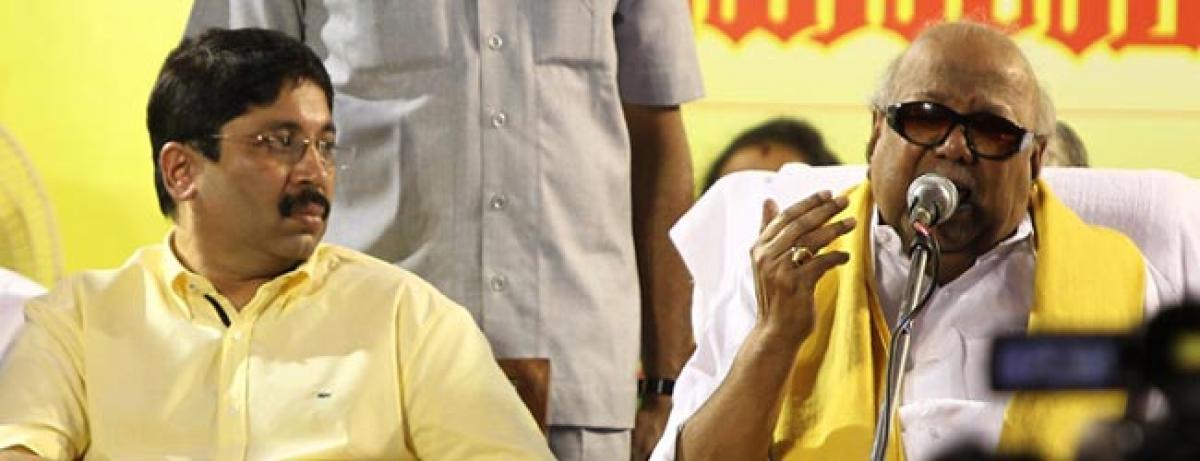Live
- Over 7,600 Syrians return from Turkiye in five days after Assad's downfall: minister
- Delhi BJP leaders stay overnight in 1,194 slum clusters
- Keerthy Suresh and Anthony Thattil Tie the Knot in a Christian Ceremony
- AAP, BJP making false promises to slum dwellers for votes: Delhi Congress
- 'Vere Level Office' Review: A Refreshing Take on Corporate Life with Humor and Heart
- Libya's oil company declares force majeure at key refinery following clashes
- Illegal Rohingyas: BJP seeks Assembly session to implement NRC in Delhi
- Philippines orders full evacuation amid possible volcanic re-eruption
- Government Prioritizes Welfare of the Poor, says Dola Sri Bala Veeranjaneyaswamy
- Two Russian oil tankers with 29 on board damaged due to bad weather
Just In

Contrary to reports that prime minister Chandra Shekhar dismissed Tamil Nadu\'s DMK government at the behest of Congress in 1991, a new book says that its \"proven links\" with the Liberation Tigers of Tamil Eelam (LTTE) militant outfit was the sole reason for its ouster.
New Delhi: Contrary to reports that prime minister Chandra Shekhar dismissed Tamil Nadu's DMK government at the behest of Congress
in 1991, a new book says that its "proven links" with the Liberation Tigers of Tamil Eelam (LTTE) militant outfit was the sole reason for
its ouster.
The book "Flying in High Winds" (Rupa, pp 270, Rs.500) by S.K. Misra, former principal secretary to Chandra Shekhar, also seeks to
"dispel perceptions" that the prime minister bowed under pressure from the Congress, which supported his government from outside, on
many issues.
Chandra Shekhar has taken all the decisions on merit, says Misra.
Chandra Shekhar's coalition government, which came to power with the support of Congress in November 1990, lasted for only seven
months.
On the accusation that the union government did not seek a report from the Tamil Nadu governor before the dismissal, the book quotes
Chandra Shekhar as saying this was not required if Article 356 was to be invoked and if the state's law and order situation warranted
such an action.
Defending Chandra Shekhar's decision to impose president's rule in Tamil Nadu, Misra says that the prime minister went ahead with this
after receiving ground-level assessments from the Research and Analysis Wing (RAW) and the Intelligence Bureau (IB).
Addressing parliament on January 10 1991, the prime minister said: "I have information that the chief minister has gone to the LTTE
headquarters not only in Tamil Nadu, but even in Jaffna, This is something very serious," the book recalls.
The book also states that J.N. Dixit, the Indian commissioner in Colombo from 1985 to 1989, in his disposition before Jain Commission,
said that except for the Congress party, all political parties in Tamil Nadu continued to support the violent activities of the LTTE against
the Indian Peacekeeeping Force in Sri Lanka.
The Jain Commission had enquired into the assassination of former prime minister Rajiv Gandhi by a suicide bomber in Sriperambudur in
May 1991.
Misra also praises Chandra Shekhar for his efforts to maintian friendly relationships with neighbouring countries, especially Pakistan. He
says that Pakistani prime minister Nawaz Sharif and the Indian leader shared a warm relationship and both had decided to set up a
hotline to facilitate communications.
Chandra Shekhar believed in a dialogue with Pakistan, though he drew criticism from the Opposition for his initiative. The book says that
he silenced his critics by urging more dialogue and informal diplomacy with the neighbour.
Misra further narrates an incident in which four Swedish engineers were kidnapped in Kashmir. Chandra Shekhar telephoned Sharif to
request the release of the engineers, saying that the news hadn't gone to the media. Though Sharif attributed the kidnapping to terrorists,
the engineers were freed within four days and this was never reported in the media, the book says.
Mishra also writes that the relationship between Rajiv Gandhi and Chandra Shekhar took a turn for the worse on India's support of US in
the Gulf war, especially on the issue of permitting US military aircraft to refuel in Bombay (now Mumbai) on their way to Iraq. However,
Chandra Shekhar stuck to his guns.
Mishra also reveals that contrary to the impression that it was the Congress that withdrew support to the government, it was Chandra
Shekhar who decided to step down as he didn't want to toe the Congress line.
Misra also recollects his encounter with Sanjay Gandhi during his stint as joint secretary to Bansi Lal, who was the defence minister in
1977. Gandhi wanted permission to directly fly to a particular point instead of taking circuitous route. When he was denied permission to
divert from the PDR (pre-determined route), Gandhi was at his worst and flung the message from the then IAF chief, Air Chief Marshal H
Moolgavkar. "He flung the note at me and shouted 'Stupid Note,'," Mishra says.

© 2024 Hyderabad Media House Limited/The Hans India. All rights reserved. Powered by hocalwire.com







